|
|
|
Sort Order |
|
|
|
Items / Page
|
|
|
|
|
|
|
| Srl | Item |
| 1 |
ID:
178135
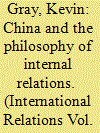

|
|
|
|
|
| Summary/Abstract |
Bieler and Morton’s Global Capitalism, Global War, Global Crisis makes an important and timely contribution to the academic study of the international political economy.1 Based on the philosophy of internal relations, the book seeks to challenge the ‘ontological exteriority’ that is typically posited between key elements of the international system, such as ideas, the social relations of production, the workplace, the ‘social factory’, and the market, state and inter-state system. While the authors draw on a range of theoretical resources and approaches, it is the historical materialism of Antonio Gramsci that provides the key intellectual resource for the numerous theoretical interventions made in the book. For example, Gramsci’s critique of economism and statology provides the basis of an insightful intervention into the structure-agency debate by emphasising the intersections between the social relations of production and class struggle. Gramsci’s theory of hegemony and the integral state, on the other hand, provides the basis of an understanding of the material structure of ideology. As such, Bieler and Morton further strengthen the case for the relevance of Gramsci’s writings not just for the field of International Political Economy but for social theory more broadly.
|
|
|
|
|
|
|
|
|
|
|
|
|
|
|
|
| 2 |
ID:
178126
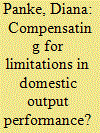

|
|
|
|
|
| Summary/Abstract |
Cooperation in regional international organizations (RIOs) can help member states to work toward and perhaps achieve policy goals that would not be feasible unilaterally. Thus, RIOs might be used as a means of states to compensate for domestic shortcomings in output performance. Do states equip RIOs with policy competencies in order to compensate corresponding domestic performance shortcomings? The analysis of a novel database on policy competencies of 76 RIOs between 1945 and 2015 reveals that usually RIOs are not usually used as window-dressing devices by which states disguise limited domestic output performance. Instead, governments tend to equip RIOs with policy competencies in order to further strengthen their already good output performance in most policy areas. However, in the policy area, ‘energy’ states tend to confer more competencies to their respective RIOs, the worse they perform domestically, indicating that output-related compensation dynamics might be at play in this field.
|
|
|
|
|
|
|
|
|
|
|
|
|
|
|
|
| 3 |
ID:
178133
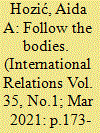

|
|
|
|
|
| Summary/Abstract |
Global Capitalism, Global War, Global Crisis by Andreas Bieler and Adam Morton makes a persuasive case for the enduring relevance of historical materialism as the hermeneutical tool for analysis and understanding of contemporary political economy.
|
|
|
|
|
|
|
|
|
|
|
|
|
|
|
|
| 4 |
ID:
178136
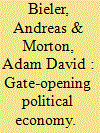

|
|
|
|
|
| Summary/Abstract |
There is a spirit of critique that is dialogical, sincere, and rigorous that defines this forum on Global Capitalism, Global War, Global Crisis from authorities we regard as shaping the recent past, the now present, and the near future of political economy.
|
|
|
|
|
|
|
|
|
|
|
|
|
|
|
|
| 5 |
ID:
178128


|
|
|
|
|
| Summary/Abstract |
This forum brings together critical engagements with Andreas Bieler and Adam David Morton’s Global Capitalism, Global War, Global Crisis to assess the prospects and limits of historical materialism in International Studies. The authors’ call for a ‘necessarily historical materialist moment’ in International Studies is interrogated by scholars working with historical materialist, feminist and decolonial frameworks in and beyond International Relations (IR)/International Political Economy (IPE). This introductory essay situates the book in relation to the wider concerns of historical materialist IR/IPE and outlines how the contributors assess the viability of Bieler and Morton’s historical materialist project.
|
|
|
|
|
|
|
|
|
|
|
|
|
|
|
|
| 6 |
ID:
178129
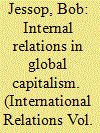

|
|
|
|
|
| Summary/Abstract |
Global Capitalism, Global War, Global Crisis seeks to overcome ontological and epistemological challenges to studying various aspects of the emerging global order in their interconnection.1 Its authors’ theoretical approach develops the philosophy of internal relations to understand the interaction of economic, political, military and social institutions, practices, and conflicts from the viewpoint of a comprehensive analysis of the uneven and combined development of capital relation on the world stage and its connection to forms of class struggle, broadly interpreted. This stresses the continued importance of the state form as nodal within global capitalism.2 My critique is based on an emerging post-disciplinary approach, cultural political economy, to which the Bieler–Morton approach has strong affinities.
|
|
|
|
|
|
|
|
|
|
|
|
|
|
|
|
| 7 |
ID:
178132
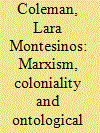

|
|
|
|
|
| Summary/Abstract |
At the heart of Global Capitalism, Global War, Global Crisis is a revolt against fetishism: the appeal to abstract categories, treating concepts as if they referred to things ‘out there’ in the world, independent of social relations). It is commonplace to note that studies of international relations routinely fetishise a system of ‘sovereign’ states, abstracted from history and the social relations, practices and ideologies that sustain state power. What Bieler and Morton emphasise is that even ‘Left’ analyses routinely make fetishistic appeal to concepts – ‘the state’, ‘the market’, ‘security’, ‘production’, ‘finance’, ‘knowledge’ – which are treated as things-in-themselves, devoid of human beings in their concrete social relations.1 Despite some scholars’ careless applications of the label ‘Marxist’ to such work, Bieler and Morton’s critique is very much in line with Marx’s own critique of a tradition of classical political economy so beholden to the modern obsession with uniformity and universality that it forcibly read history through the categories of bourgeois ideology (abstract individuals interacting in ‘the market’ and so on) that were made to look like ‘general preconditions of all production’
|
|
|
|
|
|
|
|
|
|
|
|
|
|
|
|
| 8 |
ID:
178125
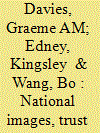

|
|
|
|
|
| Summary/Abstract |
This article uses a new dataset of Chinese student attitudes to foreign affairs to analyse how perceptions of the United States, Russia, Japan and North and South Korea affect respondent perceptions of international friendship with these states. Employing a mediation analysis we find that perceptions of national trustworthiness above all other images is the crucial factor in explaining cross-national friendship. These findings suggest that trust-building measures would be a fruitful avenue for both reducing the likelihood of conflict in the region and fostering cooperative international interactions.
|
|
|
|
|
|
|
|
|
|
|
|
|
|
|
|
| 9 |
ID:
178130


|
|
|
|
|
| Summary/Abstract |
My contribution to this forum on Andreas Bieler and Adam David Morton’s monograph reflects on how their work over the last two decades informs Global Capitalism, Global War, Global Crisis.1 In particular, I enquire into the thematic sequencing of the argument, which primarily reflects their socialization into the discipline of International Relations (IR) in the late 1990s. Yet the final chapter in parts II and III – on the social factory and ruptural resistances respectively – indicates a broader, cross-disciplinary approach to the world of international relations. Hence, I ask whether the necessarily historical materialist moment that Bieler and Morton call for is aimed at IR the discipline or the study of international relations more holistically.
|
|
|
|
|
|
|
|
|
|
|
|
|
|
|
|
| 10 |
ID:
178134


|
|
|
|
|
| Summary/Abstract |
The necessity of making sense of our current moment, one characterized – as Andreas Bieler and Adam David Morton suggest – by the interconnected forces of global capitalism, global war and global crisis is clear. Given the continuing body counts attributable to the prioritisation of rapid economic and industrial growth over ecology, to the expansion of expeditionary and pre-emptive warfare, and to the liberalisation and deregulation of economies that has reduced social welfare safety nets around the globe to tatters, it is pertinent to ask, as Bieler and Morton do, ‘what had to have happened in the past for capitalism as a mode of production to emerge and consolidate?’.1 One of Bieler and Morton’s central aims in approaching this question is to revolt against the ‘violence of abstraction’, which drawing on Sayer’s seminal work,2 they describe as eschewing the fetishisation of concepts in favour of analysing social relations rooted in specific historical and sociological practices.3 Feminist scholars have similarly asked how patriarchy, as a set of power relations, has come about, and urged us to pay very close attention to how historical social relations in different parts of the world shape people’s presents. Just as Bieler and Morton argue that historical materialism ‘does not relegate the “economic” or the “political” to spatially separate spheres but conceives of the social constitution of the economy so that relations of production are embodied in juridical-political and ideological forms’,4 so too have feminists shown how the political, economic, juridical and ideological have worked with and through each other to substantiate patriarchal social relations that often normalise the spatial separation of social spheres. Although the book engages directly and productively with some branches of feminist thought, reflecting on points of convergence and divergence reveals some of the book’s blind spots and wider contributions. In my contribution to this forum, I consider what opportunities the book offers for rethinking feminist critique after the postmodern turn and in an age of crises, and what contemporary feminist theory in turn offers historical materialism. I ultimately aim to show how the present, and the historical and sociological forces that shape it, is necessarily both a historical materialist and feminist moment.
|
|
|
|
|
|
|
|
|
|
|
|
|
|
|
|
| 11 |
ID:
178127


|
|
|
|
|
| Summary/Abstract |
In Latin America and Southern Africa, norms on violence against women have developed with ups and downs, not simply in reaction to global norms, but sometimes even preceding global norm diffusion or surpassing it in terms of scope, framing and binding character. The classic global-to-local account with a single source of norm creation cannot capture these dynamics. Including the regional level in a dynamic model of norm diffusion enables us to understand the changing contents of a norm and to acknowledge transregional agency. We show (1) how norm contestation is an ongoing, multidirectional and polycentric process; (2) how the regional level opens up opportunities for feminists and femocrats; and (3) under which conditions regional norms can be both more progressive than global ones and more adapted to regional needs, and, in turn, are thus able to strengthen the ‘global’ norm.
|
|
|
|
|
|
|
|
|
|
|
|
|
|
|
|
| 12 |
ID:
178122


|
|
|
|
|
| Summary/Abstract |
The realist theoretical tradition has never enjoyed a strong position in Europe. During recent decades, although it is commonly claimed otherwise, it even seems to have lost its limited traction and most of its relatively few representatives. The aim of the article is to analyse this evolution, highlight how realist theorists have contributed limited conceptual or theoretical innovation, been unable to adjust their research agenda to current analytical challenges, and produced relatively few comprehensive empirical studies informed by one or more realist theories. Instead, we observe three main activities. Some realists do meta-studies on realist theory. Others do retrospectives, for instance, (re-)discovering the qualities of classical realist scholars or classical concepts such as the security dilemma. Still others practice ideology that may enjoy certain functions in legitimising national foreign policy orientations but has limited theoretical quality. Thus, textbooks are probably the only remaining context in which realism is presented as constituting a dominant orientation; a fact that highlights the complex and problematic relationship between reality and representation.
|
|
|
|
|
|
|
|
|
|
|
|
|
|
|
|
| 13 |
ID:
178123


|
|
|
|
|
| Summary/Abstract |
European non-governmental development organisations (NGDOs) have used naming and shaming extensively in their advocacy to push the EU and member state governments to implement international norms on foreign aid. The paper analyses the contents of NGDO advocacy publications, with the goal of gaining insight into how and why these organisations engage in naming and shaming. The exercise reveals that NGDOs are highly selective in the norms they promote through naming and shaming: they shame governments heavily for not implementing norms on aid quantity, but are less vocal on norms related to aid effectiveness. The paper shows that NGDOs strategically select norms in their naming shaming activities which have higher resonance with the public and are less costly to monitor, criteria which aid quantity norms fulfil. There is also some evidence that NGDOs promote increasing the quantity of aid because it would enhance their own access to donor funding.
|
|
|
|
|
|
|
|
|
|
|
|
|
|
|
|
| 14 |
ID:
178124
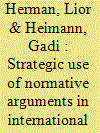

|
|
|
|
|
| Summary/Abstract |
This article claims that normative arguments play a greater role in negotiations than existing scholarship implies. While the approaches of communicative and rhetorical action limit the use of arguments to environments that meet certain conditions, in fact normative arguments are widely used and can be found in almost every example of negotiations. This article seeks to explain this phenomenon. Negotiating parties that feel obligated to tackle normative arguments raised by the opposing side – either because of the presence of an audience or to maintain its reputation – have a number of tools at their disposal. Negotiators who are unsuccessful in tackling these arguments will tend to offer a proposal that is more attractive to the other side. Although normative arguments do not generally have a sweeping influence on the outcome of negotiations, they are still likely to play a significant role. The article applies this theoretical framework to the case of the lengthy negotiations between the EEC and Israel, in which the former had no material motivation and desire to cede to Israel’s demands and nevertheless did so.
|
|
|
|
|
|
|
|
|
|
|
|
|
|
|
|
| 15 |
ID:
178131


|
|
|
|
|
| Summary/Abstract |
With Global Capitalism, Global War, Global Crisis, Andreas Bieler and Adam David Morton have written a rich and original book arguing for the necessity of a ‘historical materialist moment’ in the study of international change and development. The book raises several key theoretical, conceptual and methodological questions about the nature and scope of IR and IPE, and offers innovative responses to long-standing debates. Of particular importance is their argument for a relational ontology that recognises the extent to which entities do not stand on their own, independent and external to one another.1 On the contrary, seemingly disconnected social categories are in fact internally related precisely because they are elements of the same social whole. Given the tendency within the field to conceptualise states and markets as independent and exogeneous structures, the authors’ case for the philosophy of internal relations represents a refreshing proposal that holds the promise of a truly integrated theoretical framework capable to account for the interaction between global capitalism and the states system.
|
|
|
|
|
|
|
|
|
|
|
|
|
|
|
|
|
|
|
|
|